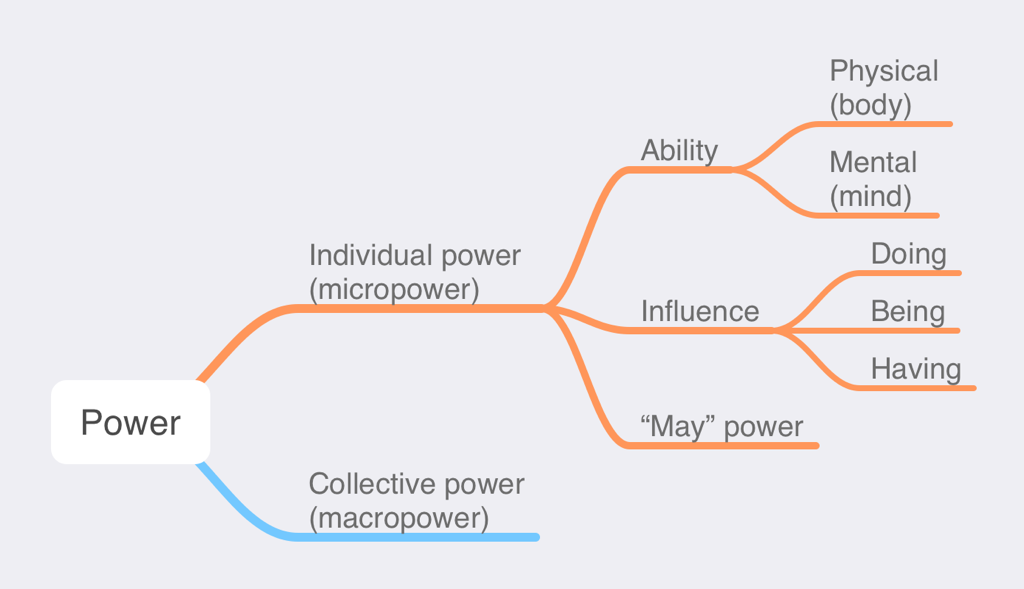- About
- Introduction
-
Browse the book
-
All the pages alphabetically
>
- A >
- B >
- C >
- D >
- E >
- F >
- G >
- H >
- I >
- L >
-
M
>
- Main theories of power
- Making an effort is a prerequisite of using power
- Marxism and the meaning of power
- "May" power
- Meanings of power that are not directly related to social power
- Micropower: Individual power
- Mindfulness
- Media and Digital Literacy as Forms of Individual Power
- (Mis)understanding of power in media texts
- Money and Power
- My synesthetic perception of "power"
- N >
- P >
- R >
- S >
- T >
- U >
- V >
- W >
- Completed pages
-
All the pages alphabetically
>
- Author
Macropower: Collective Power
PAGE IN PROGRESS
What you see here is a page of my hypertext book POWER of meanings // MEANINGS of power. Initially empty, this page will slowly be filled with thoughts, notes, and quotes. One day, I will use them to write a coherent entry, similar to these completed pages. Thank you for your interest and patience!
What you see here is a page of my hypertext book POWER of meanings // MEANINGS of power. Initially empty, this page will slowly be filled with thoughts, notes, and quotes. One day, I will use them to write a coherent entry, similar to these completed pages. Thank you for your interest and patience!
- Individual vs society: Examples from Harari how people support collective order but supporting such constructs as money, laws or human rights. People support them, so do that have power over them? Collectively yes but not individually. If I individually don’t support some of these constructs, they will still exist. Even when many people don’t support them, they may still exist, because so many other people do support them. In this relationship, the question of power becomes very complicated.
- On the other hand, how do ideas change? How did the idea about peoples right appear, spread and became so powerful? Did it start from one person? Probably not. But individuals did play a role in making this idea wide spread and powerful
- Harari, end of Chapter 6: “Es gibt also keinen Ausweg aus der erfundenen Ordnung. Wenn wir die Gefängnismauern niederreißen, um in die Freiheit zu laufen, landen wir unweigerlich im Hof eines noch größeren Gefängnisses.”
Carbó-Catalan, Elisabet, and Diana Roig-Sanz, eds. 2022. Culture as Soft Power: Bridging Cultural Relations, Intellectual Cooperation and Cultural Diplomacy. Berlin: De Gruyter.
Schwartz, Joan M. 1995. “‘We Make Our Tools and Our Tools Make Us’: Lessons from Photographs for the Practice, Politics, and Poetics of Diplomatics.” Archivaria 40: 40–74.
Dog being frightened by its own flatulence (not the most elegant example); in people this is complicated by the fact that they produce things together; one can imagine a construction worker walking into a cathedral that he or she participated in creating and being overwhelmed by awe. They made it, boy it’s not a part of them anymore, it has power over them.
Harari : cultures are like parasites that need people to spread (meanings are like parasites) - connect to macropower
Culture or evolution does not benefit individuals
discourse (Foucault)
three forms of macropower that I will discuss
-technology
- media (including language and stories)
- bureaucracy (for example, https://helpfulprofessor.com/bureaucracy-examples/; more specific example: https://firstamendmentcoalition.org/2016/05/aa-shopping-centers-california)
movie Brazil
There is an idea that technologies that people create do not just reflect who people are, they also change who people are.
as we go through our everyday life we do things that seem obvious ; but why do we do them? Not soppy because we choose to (although individual choice plays a role); we do things based on what other people (thousands, millions, billions) did before us; or what other people around the planet are doing
people create systems that are bigger than them Amit not entirely comprehensible to them and that impact them
society as a whole - main example
society does not fit specific individuals
society is all about survival of species
stories we tell ourselves and then forget that these are just stories
meanings that we invent to help ourselves understand things, but then we forget that these are just something we invented and we can change
technology we create to assist us but then forget that it is flawed
AI - Shannon Vallor "The AI Mirror" - we think that AI will help us see or shape our future but we forget that it is just a reflection of our past - our humanity filled with biases and flaws
AI Mirror, chapter 3 note: "Another one of Husserl’s students, Martin Heidegger, observed the connection between modern technology and this view of ourselves and our fellows as resources: Bestand, or “standing reserve” to be ordered and exploited. His work had a powerful influence on late twentieth-century philosophy and ethics of technology, although his influence today has been much dimmed by the growing acknowledgement of his deep-seated anti-Semitism and willing complicity with the Nazi regime. See <<<REFO:BK>>>Martin Heidegger, The Question Concerning Technology and other Essays, Translated by William Lovitt. (New York: Harper & Row, 1977)<<<REFC>>>."
Chapter 5:
"All technologies are mirrors, because all technologies are extensions of human values into the built world. Every technology—from the wheel, to the book, to the engine, to the computer—reflects what humans of certain times and places thought was worth doing, making, enabling, improving, or trying. "
fears about technology overpowering individuals (rebellion of the robots); it does not need to be so dramatic; different technicians trying to understand and fix our furnace; it’s not that they are stupid or mean, it’s that technology (created by multiple people over time) escapes control of an individual (see book Knowledge Illusion)
smaller examples: countries, corporations, organizations
we deal with individuals, but we actually deal with systems/meanings that are channeled through these individuals
we blame specific individuals while we don’t recognize that their actions are determined by systems/meanings that we are a part of ourselves that we contribute to though our daily actions (power as influence)
individual does not care about society, society does not care about individual; which seems paradoxical but actually makes sense from the survival of species point of view; two different survival mechanisms embedded: individual survival, egoism (society needs individuals because it made of individuals, survival mechanism need to be embedded in every individual ) and group survival, altruism; these two survival impulses can be at times in a tension that can be resolved differently (individualistic vs collectivistic societies)
does it mean that if we let society be as it is with any imperfections, without considering individuals, that would be the best for society?
not Necessarily, as ecological problems demonstrate
are ecological problems a result of social development that was meant to help individuals?
Our behavior is influenced by what we think other think about our behavior
We do what we think is acceptable
Harari, chapter about religion:
” Da alle gesellschaftlichen Ordnungen von Menschen erfunden werden, sind sie zerbrechlich, und je größer eine Gesellschaft, umso zerbrechlicher sind sie. Den Religionen kam eine zentrale Aufgabe zu, weil sie diese zerbrechlichen Ordnungen legitimieren, indem sie auf einen übermenschlichen Willen verwiesen. Die Religionen behaupten nämlich, dass unsere Gesetze nicht etwa einer menschlichen Laune entspringen, sondern von einer absoluten Autorität angeordnet wurden. Auf dieser Grundlage lassen sich einige Prinzipien formulieren, die nicht in Zweifel gezogen werden können und der Gesellschaft ein stabiles Fundament geben.”
No intentionality on this level
power of her beauty:
beauty used intentionally (micro power)
beauty used intentionally - discourse- beauty is in the the of the beholder - macropower
maybe (often is?) a combination
Meanings as example of macropower
Meaning of money
Language has power over us: this is actually a form of macro power. Language existed through people, so what has power over an individual is other individuals, although some of these individuals may have more micro power than others.
Social constructs as macropower
money: most people need to accept meanings of money in order for the economic system to function. Some of the individuals who contribute to the macropower of money may be actually really disadvantaged by the economic system (poor people). Having less micro power does not mean not being part of macropower.
A short boy in school may feel embarrassed and disadvantaged by his height. His other qualities do not matter because, according to expectations of his culture, boys are supposed to be tall, not short. [girls are called "shorty" in an endearing way]
macropower determines micropower - expectations of his environment determine what the short boy can do; but also determine what other kids can tell him about his height
Sapiens: myths that support social order
chapter 8: vicious circles of castes (India) and race (US)
Culkin (not McLuhan): "We shape our tools, and our tools shape us."
Power of meaning is related to circumstances. We are conditioned by circumstances to see some meanings while ignoring (or not even being aware of) others.
corporations - mini society
goal of corporation is survival and growth
individuals don’t matter as long as they contribute to survival and growth
Example: big pharma and antibiotic research https://www.smithsonianmag.com/science-nature/astonishing-medical-potential-soil-northern-ireland-graveyard-180973741/
technioogy: different people trying to fix our furnace; people create mechanisms that they don’t fully understand; futuristic fears about the revolt of the machines (was our furnace revolting?)
5% conflicts: when conflicts become bigger than people who participate in them (macropower)
If you are interested in getting updates about this project (e.g., when new pages are published), please sign up for the newsletter on my main website.
THIS WEBSITE CONTAINS NO AI-GENERATED CONTENT
- About
- Introduction
-
Browse the book
-
All the pages alphabetically
>
- A >
- B >
- C >
- D >
- E >
- F >
- G >
- H >
- I >
- L >
-
M
>
- Main theories of power
- Making an effort is a prerequisite of using power
- Marxism and the meaning of power
- "May" power
- Meanings of power that are not directly related to social power
- Micropower: Individual power
- Mindfulness
- Media and Digital Literacy as Forms of Individual Power
- (Mis)understanding of power in media texts
- Money and Power
- My synesthetic perception of "power"
- N >
- P >
- R >
- S >
- T >
- U >
- V >
- W >
- Completed pages
-
All the pages alphabetically
>
- Author

